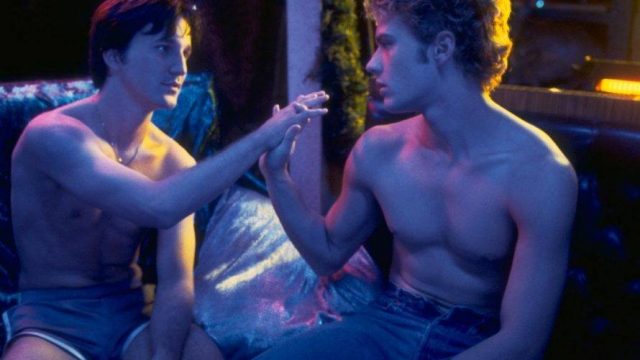The FAR keeps turning up in the manner of bad pennies. They return to insane stunts, to box office flops, to successful careers, to the movie theaters themselves – ready for more and in the case of certain director’s cuts, properly re-queerified.
Thanks to The Psychic Johnny Smith for contributing this week, may he always keep returning. Send articles through the next week to ploughmanplods [at] gmail, post articles from the past week below for discussion, and Have a Happy Friday!
For Polygon, Robert Daniels does a deep analysis on the films and limited series work of Barry Jenkins:
Similar to Medicine for Melancholy, Moonlight operates around the difficulty of being and becoming. While teaching Chiron how to swim, Juan shares how an old lady once told him, “In moonlight, Black boys look blue.” The being is the fact of his existence: Chiron is Black. He is a boy. The becoming is the change: In a different light, he might be blue. In the future, he might identify as gay. Juan’s assessment succinctly explains the arc of Blackness that’s present in Jenkins’ work: The stability of the communal spirit residing in Black folks, and the ways the idea of Blackness is consistently evolving.
Craig Lindsey wrote in Crooked Marquee about the time that Harvey Weinstein demanded a toned-down movie about Studio 54:
[Mark] Christopher, a queer filmmaker who directed the gay-themed shorts The Dead Boys’ Club (1992) and Alkali, Iowa (1995) before making 54, had no problems throwing some LGBTQ subject matter into the already sexually-adventurous mix. He made Shane bisexual, getting it on with both women and men. He even kisses Greg and, immediately afterwards, has sex with Anita in a bathroom (while Rubell watches). All that lascivious behavior apparently didn’t win over middle-American moviegoers. Weinstein forced Christopher to tone things the hell down, killing the whole love-triangle angle. He also wanted to play up a budding romance between Shane and a soap-opera actress (Campbell). “We wanted to shoot a dark movie,” Christopher told the Philadelphia Inquirer in 2015. “In the studio release, they pumped a bunch of light into it.” The whole experience made Christopher step away from Hollywood, opting to teach film and television at Drexel University in his later years.
In Variety, Owen Gleiberman has thoughts about a brewing culture war around the return of the movie theater:
Before “The Sopranos,” who would have foreseen the television revolution? Maybe what we need now is another movie revolution, a return to the idea that they can be the lifeblood. Streaming may siphon off viewers, but the numbers this weekend told a striking story, one that was not foregone. Those numbers said: The love is still out there. Right next to the cup holders and the butter machine. Maybe it’s time to put in some real butter.
At GQ, Sam Schube profiles an aging (but still game) Johnny Knoxville and his enduring legacy:
It was easy at the time to describe Jackass as lowest-common-denominator entertainment, a feeble nadir in TV’s race to the bottom. With time, though, it became clear that the show was operating at the intersection of a number of ancient American traditions. If you squinted, you could see traces of Buster Keaton and the Three Stooges. Knoxville’s outlaw influences were present too. Spike Jonze told me that he and Tremaine and Knoxville hadn’t discussed how the stunts might be introduced on the show, so Knoxville improvised what would become a signature opening to each segment. “He started saying, ‘Hi, I’m Johnny Knoxville and this is the Cup Test,’ or whatever it was,” Jonze wrote in an email. “Only later, I remember listening to Johnny Cash Live, and hearing Johnny Cash say, ‘Hi, I’m Johnny Cash and this is “Folsom Prison Blues,” ’ and a lightbulb went off. I was like, damn…no wonder it’s so iconic.”
Lifehacker’s Joel Cunningham puts together a list of 35 films that flopped at the box office but deserve a second look:
After a troubled, pricey production, early screenings of the film went so poorly that many distributors elected not to show it, resulting in a disastrous sub-$1 million box office gross that nearly spelled the end of Coppola’s Zoetrope Studios. It’s hardly a movie for everyone, but you can clearly see its slice-of-city life influence in later Oscar sensation La La Land, and even a misfire from Coppola is worth seeing at least once.

